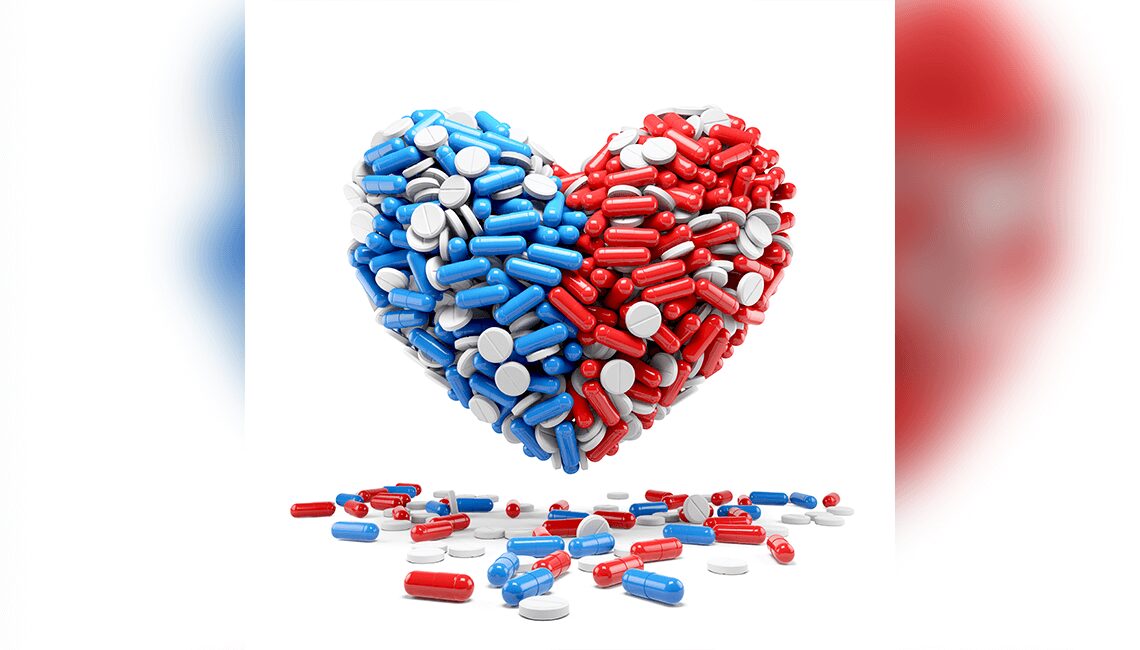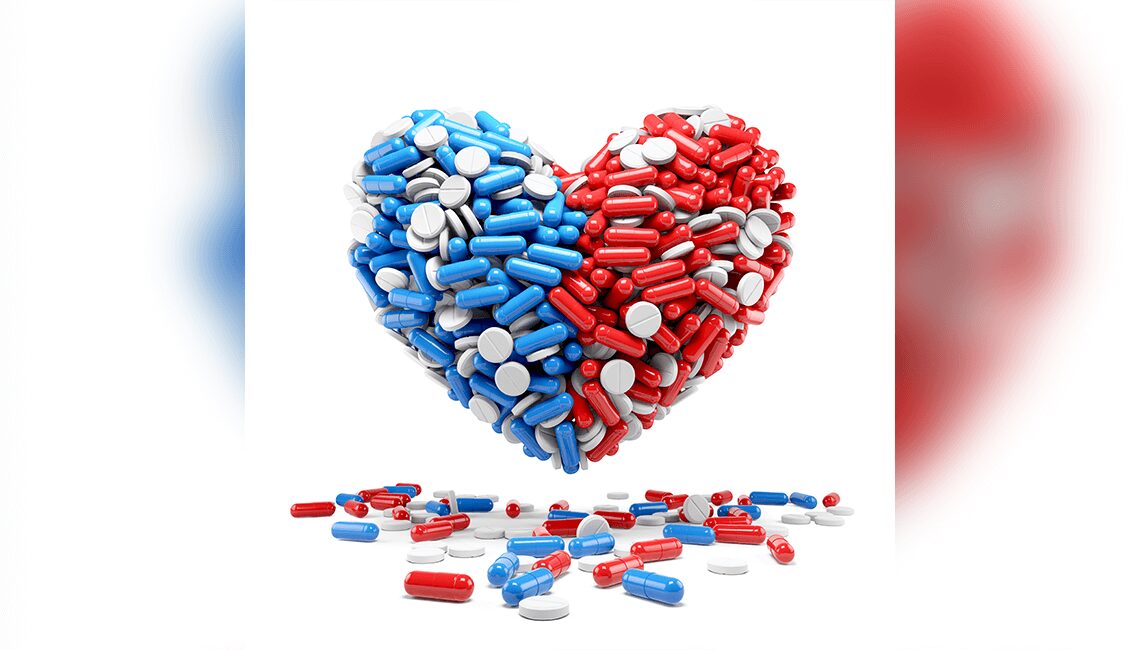In the battle against heart disease, high cholesterol has long played the villain, and statin drugs hailed the hero. But are they really the best line of defense in matters of the heart?
By Dr. Sharon McQuillan
You’re with a small circle of friends on a girls’ night out and the conversation turns to heart health. A friend shares that she’s shaved several points off her cholesterol. High-fives all around. How did she do it? Nobody asks. Getting that number down seems to be all that matters.
It has been ingrained in our brains that heart disease is a numbers game, and high cholesterol is the main player. For more than four decades, the red badge of heart health has meant dropping your cholesterol below a target number (recently lowered to 190). Meanwhile, since 1984, statin drugs—which inhibit the body’s ability to make cholesterol— have routinely been prescribed for men and women with cholesterol levels higher than 200.
It’s estimated that a quarter of Americans, ages 45 or older, are already taking statin drugs. The American Heart Association and American College of Cardiology’s 2013 Heart Disease Prevention Guidelines caused some controversy in announcing that they no longer place the entirety of their focus on lowering cholesterol numbers to a certain target goal. The new guidelines divide at-risk people between two categories. The first is high risk, because they’ve had heart attacks, have diabetes, or extremely high levels (190+) of “bad” cholesterol. The second is elevated risk—those with 75 percent risk or more of heart attack or stroke, according to a risk calculator. “The new guidelines make up to 30 million people appropriate for statins,” says Dennis Goodman, M.D., director of integrative medicine at NYU Langone Medical Center.
But despite 40-plus years of statins being prescribed, cardiovascular disease remains the number-one cause of death in the United States, and that number is expected to increase to 23.6 million by 2030, according to the American Heart Association. In February 2015, the U.S. Department of Health & Human Services released new dietary guidelines that no longer deem high-cholesterol foods such as shrimp, lobster, and eggs off-limits. After 50 years of warnings, researchers found no relationship between consuming cholesterol in foods and an uptick in cholesterol in blood serum.
It seems that the medical community is de-villainizing cholesterol. So why the push for statin use, and possible overuse? According to Joseph Mercola, D.O., more than 900 studies show that statins have a host of unhappy side effects including muscle pain and weakness, neuropathy, cognitive impairment, cancer, and depression. In light of the risks and questioned effectiveness of statins, should you be blindly jumping on the statin bandwagon, or are there better options out there?
IS CHOLESTEROL EVIL?
IT TURNS OUT YOUR BODY NEEDS cholesterol just as much as it needs oxygen. Cholesterol is a building block of cell membranes and the protective covering that surrounds nerve fibers. Cholesterol’s necessary for mineral and vitamin D metabolism and is vital for good brain function, as well as the production of sex hormones for both men and women. Cholesterol also plays a key role in helping our brains create memories and usher in the “feel good” chemical serotonin. However, too much of certain types of cholesterol in your blood can mean trouble. You’re probably familiar with LDL-low density lipoproteins (aka “bad cholesterol”) and HDL-high density lipoproteins (aka “good cholesterol”), commonly part of the cholesterol blood panel. HDL particles are responsible for removing cholesterol out of the bloodstream and carrying it to your liver, where it’s destroyed.
LDL particles, when present in great numbers, tend to “stick” to your artery walls, and are referred to as plaques. These plaques not only block blood flow, but are responsible for a series of chemical reactions, which cause inflammation, damage to the lining of your arteries, and—eventually, if unchecked—a clot that can lead to a heart attack. Statin drugs such as Lipitor and Crestor inhibit the production of cholesterol in your body. Unfortunately, in doing so, they also prevent the formation of some other important substances your body needs for peak performance. Statins affect the mevalonate pathway, responsible for the production of sex hormones (estrogen and testosterone), cortisone, and dolichols, which are an important part of cell membranes.
Additionally, statins minimize your body’s ability to make vitamin D and depletes Coenzyme Q10, which is very important for energy, blood-sugar maintenance, and the neutralization of free radicals. Side effects of statin drugs manifest as muscle pain and weakness, anemia, cognitive problems, and memory loss. Additionally, statin drug use has been linked to increased insulin resistance, the first step in developing diabetes. Statin drug use can increase your risk of heart failure, chronic fatigue syndrome, Parkinson’s disease, Alzheimer’s disease, high-blood pressure, and cancer. Dr. Goodman is skeptical of the value of statins for use in the elevated risk category. This is due to the 2010 Archives of Internal Medicine publication of an analysis of 66,000 people studied.
The individuals had some risk of heart disease and were prescribed statins, but showed no evidence of benefit from taking the drugs. “People with heart disease don’t live any longer with lower cholesterol,” says Carolyn Dean, M.D., N.D., author of The Complete Natural Medicine Guide to Women’s Health, and recipient of the Award for Outstanding Medical Contribution to Cardiac Rhythm Management Services by the Arrhythmia Alliance. “The drug industry did a good job of creating a fear of cholesterol.” Dr. Dean says that statin drugs bind up the mineral magnesium. That causes muscle cramps and several other side effects.
“I’m not keen on statin drugs,” she says. “We know from scientific research that magnesium is a natural statin that helps regulate the enzyme responsible for cholesterol, while statin [drugs] kill the enzyme.”
SIMPLE LIFESTYLE CHANGES, BIG RESULTS
SO WHAT ARE YOUR OPTIONS IF you’re concerned about the effects of statins? Turns out there are a number of alternatives to statin drugs that boast rather impressive results. “A whole foods, plant-based diet affects inflammation the same way without having to be on drugs the rest of your life,” says Dean Ornish, M.D., who pioneered the Lifestyle Medicine movement and helped former President Bill Clinton revamp his lifestyle by placing him on a plant-based diet.
“Statins are a proven benefit for people with heart disease, but the evidence is less compelling in people who aren’t already afflicted with the condition. You need to treat the underlying problem.” That problem? Inflammation, which skyrockets from consuming too much sugar and processed foods.
With big lifestyle changes, Dr. Ornish’s studies have shown that “patients slash their LDL numbers by 40 percent [comparable to statins], but also reverse the risk of type 2 diabetes by decreasing hemoglobin A1C to levels below 7 percent—and the only side effects are good ones,” says Ornish. “Animal protein itself is harmful, and people who consume it have a 75 percent increase in death rate from all causes. A plant-based diet has been shown in a number of studies to reverse heart disease by turning on the good genes.”
In the International Journal of Cardiology (February 2013), a study found that people who took a supplement of the Italian citrus fruit bergamot were able to cut the dosage of their statins in half. The fruit’s flavonoids inhibit the production of cholesterol in the liver “just like statins” increasing HDL and improving insulin resistance.
Red yeast rice is popular in Chinese medicine as a natural method of lower-ing cholesterol. It contains an active ingredient, monacolin K, that’s known as lovastatin. An analysis of 93 random-ized controlled trials from China showed that red yeast rice could lower total cholesterol levels, LDL, and triglycer-ides and raise HDL levels when com-pared to placebo. (There are some risks in combining red yeast rice supplements with other medications, including statins, so self-experimentation without medical advice is not recommended.)
One of the most promising supplements in heart health is an omega-7 fatty acid, palmitoleic acid, as it seems to lower cholesterol levels as well as the systemic inflammation associated with cardiovascular disease. A randomized, placebo-controlled trial recently published in the Journal of Clinical Lipidology (2015) showed that 60 subjects given palmitoleic acid for 30 days showed a 15 percent reduction in triglyceride levels, an 8 percent decrease in LDL levels, a 44 percent reduction in C-reactive protein (a marker for inflammation connected to cardiovascular risk), and a 5 percent increase in HDL levels. This omega-7 fatty acid is unique in that it effectively addresses two risk factors for cardiovascular disease without any side effects.
So should you get on the statin band-wagon? It seems that if you’re not already suffering from cardiovascular disease, you may be able to avoid the hazards of statin drug’s side effects, provided you are willing to commit to lifestyle modification and supplementation. If you’re already taking statin drugs, it may be possible to lower the amount of medication needed, or wean off of the medication over time. As always, you should have a discussion with your doctor regarding statin therapy, providing full disclosure of all of your habits and all the medications and supplements you take in order for them to provide you with the best options. And chances are modifying your diet, exercise, and supplement routine will benefit you in myriad ways—not just with your heart.
Dr. Ornish may have said it best: “Eat well, move more, stress less, and love more.” Advice we can all follow.












